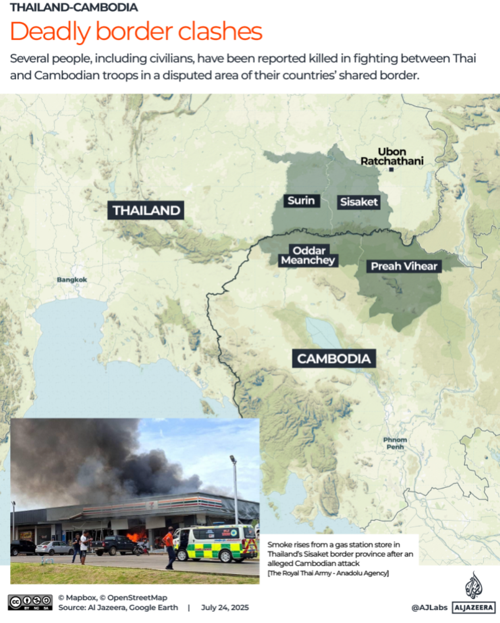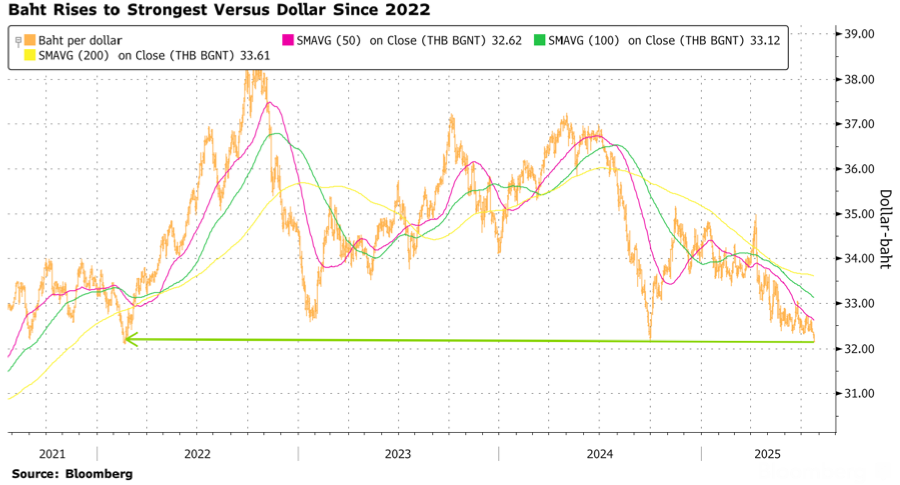Jump on a plane in Bangkok and an hour later when you arrive in Nakhon Ratchasima, you will find yourself in another Thailand. A Thailand that few tourists visit far away from the usual beaches and temples. Here, the land is flat except for a few ancient volcanic hills with rice paddies everywhere slowly giving room to jungle as you approach the Cambodian border. Another clue that you are far from the center is that the temples are all Khmer with their square configuration and central towers. And then there is the border, poorly delineated which strangely you must cross to visit another temple which happens to be Thai but is in fact on the other side.
This in other words is a perfect set up for perpetual conflict except of course that the people living there are exceptionally peaceful and more busy minding their own business that looking for trouble next door.
So everything would be fine in this lush and no so rich border if it wasn't for politicians in Bangkok and Phnom Penh. Over there too, most of the time, their attention is far away from this remote border. Only once per decade when political pressure rises do they suddenly remember about this little known corner of their respective countries and tensions rise temporarily.
Usually, it is Cambodian politicians who happen to be under pressure, so a few shots are fired and things return to normal after a few weeks. What is different this time is that pressure has been piling up on both sides so somehow escalation looks like a good option for both countries...
A long-standing border dispute between Thailand and Cambodia sharply escalated overnight, with reports that a Thai F-16 fighter jet conducted air-to-ground strikes on multiple Cambodian military positions near the disputed border region.
Reuters reports that Thailand readied six F-16 fighter jets but deployed only one along the disputed border. The F-16 conducted airstrikes on military targets in Cambodia. Both Southeast Asian nations have accused each other of starting the conflict.
Thai army deputy spokesperson Richa Suksuwanon told reporters earlier, "We have used air power against military targets as planned."
In response to the attacks, Cambodia's defense ministry said that it "strongly condemns the reckless and brutal military aggression of the Kingdom of Thailand against the sovereignty and territorial integrity of Cambodia."
Here are more details via Bloomberg:
Both Southeast Asian nations accused the other of starting the clashes, which were reported at six locations and follow a build up of tensions since a Cambodian soldier was killed in an exchange of gunfire in May.
Thailand said its fighter jets hit two Cambodian army bases near the border on Thursday, while Thai army reported that rockets fired from Cambodia killed several civilians, citing provincial authorities. The fatalities included an 8-year-old child, and 14 others were injured. The number of casualties on the Cambodian side remains unclear.
"The dispute is escalating rapidly and could turn into a serious conflict if left unattended," said Jayant Menon, a senior fellow at the ISEAS-Yusof Ishak Institute in Singapore, quoted by Bloomberg.
For over a century, Thailand and Cambodia have disputed sovereignty claims along parts of their shared 508-mile land border. Boundary ambiguities stem from colonial-era treaties and inconsistent mapping practices dating back to the 1907 Franco-Siamese agreement. A notable 2011 skirmish lasted one week with multiple fatalities.
If the conflict deepens, it could jeopardize ASEAN diplomacy and erode trust among member states. On the one hand, Cambodia is a close ally of Beijing, while Thailand has traditionally maintained strong ties with the United States. This escalation unfolds amid ongoing great power tensions between China and the U.S.
In markets, Thailand's baht and stocks fell on news of the clashes, as the conflict news adds further pressure to an economy already under pressure from the threat of a 36% U.S. tariff on its exports.
Meanwhile, several unresolved border disputes remain in the region, including those between Myanmar and Thailand, Laos and Cambodia, Malaysia and Indonesia, and Vietnam and China (specifically, the South China Sea). A Thailand–Cambodia war could spill over and ignite other flashpoints across the ASEAN area.
Menon noted: "Although the conflict is unlikely to spread beyond the two countries, it will disrupt trade and people movement, which will negatively affect the regional economy."




No comments:
Post a Comment